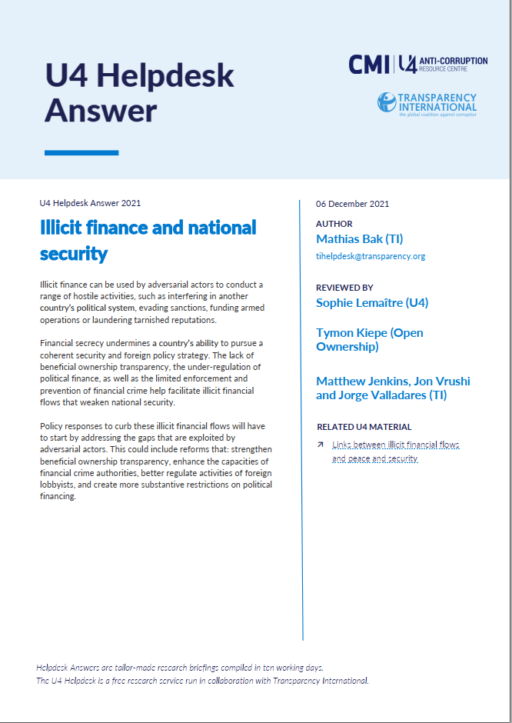
This Anti-Corruption Helpdesk brief was produced in response to a query from a U4 Partner Agency. The U4 Helpdesk is operated by Transparency International in collaboration with the U4 Anti-Corruption Resource Centre based at the Chr. Michelsen Institute.
Query
How and where is illicit finance used by adversarial actors to undermine national security?
Summary
Illicit finance can be used by adversarial actors to conduct a range of hostile activities, such as interfering in another country’s political system, evading sanctions, funding armed operations or laundering tarnished reputations.
Financial secrecy undermines a country’s ability to pursue a coherent security and foreign policy strategy. The lack of beneficial ownership transparency, the under-regulation of political finance, as well as the limited enforcement and prevention of financial crime help facilitate illicit financial flows that weaken national security.
Policy responses to curb these illicit financial flows will have to start by addressing the gaps that are exploited by adversarial actors. This could include reforms that: strengthen beneficial ownership transparency, enhance the capacities of financial crime authorities, better regulate activities of foreign lobbyists, and create more substantive restrictions on political financing.
Contents
- Introduction
- Delineation, concepts and caveats
- Illicit finance and malign political interference by foreign actors
- Reputational laundering
- Sanctions evasion
- Potential policy responses
- References
Main points
- The use of illicit finance to conduct hostile activities can be thought of as a hybrid threat.
- Illicit finance is used as part of foreign influence operations, targeting both politicians and more grassroots-level actors.
- Adversarial actors can exploit vulnerabilities in poorly regulated financial systems to finance more openly hostile activities, such as the proliferation of weapons, violent extremism, armed operations and organised crime.
- Efforts to counter the use of illicit finance by hostile interests will have to begin at home.
- Potential policy responses include legislation that improves beneficial ownership transparency and the transparency of political financing.
Authors
Mathias Bak, [email protected]
Reviewers
Matthew Jenkins, Jon Vrushi and Jorge Valladares (TI)
Sophie Lemaître (U4)
Tymon Kiepe (Open Ownership)
Date
07/12/2021

